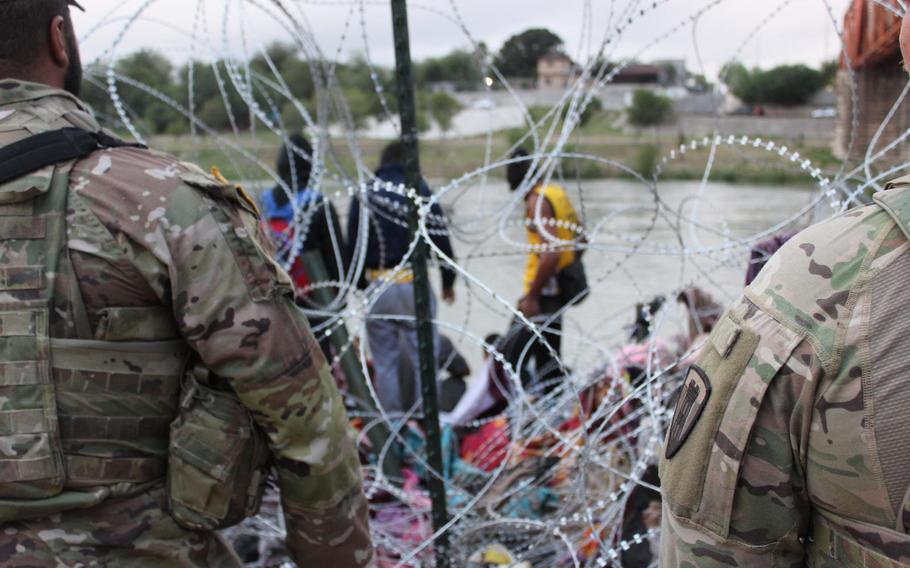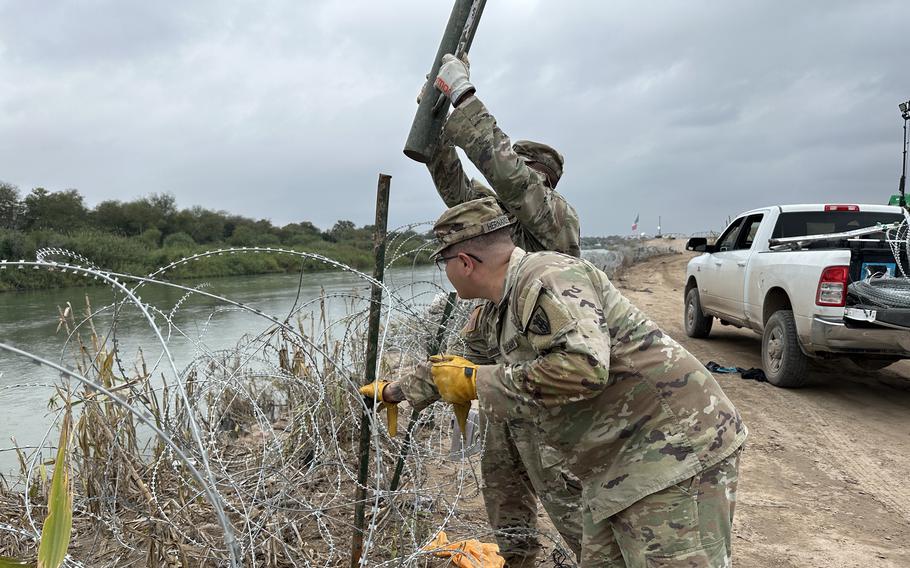
Texas National Guard soldiers block a large group of migrants from entering the U.S. from Mexico between legal ports of entry near the west Texas city of Eagle Pass. (Texas Military Department)
AUSTIN, Texas — Federal agents can resume a practice of cutting wire barrier placed near the U.S. border with Mexico by Texas National Guard troops after a judge on Wednesday ruled against a request from the state of Texas to stop them from doing so.
A temporary hold on cutting the barriers had been in place since October as part of an ongoing lawsuit that Texas Attorney General Ken Paxton filed against the Department of Homeland Security that alleges cutting the barriers is damaging the state’s property. The temporary hold only protected barriers installed in the west Texas city of Eagle Pass, which has seen a steep increase in border crossings this year.
The fight between state and federal authorities at the border comes as record levels of migrants cross into the United States. Customs and Border Protection said it detained nearly 2.5 million people at the southwest border during fiscal 2023, which ended Sept. 30.
Guard troops placed the coiled barbed wire near the state’s border with Mexico as part of Operation Lone Star, a two-year-old, state-sponsored mission to deter migrants from crossing into the United States between legal ports of entry.
The Texas Military Department said troops working on Operation Lone Star have installed nearly 106 miles of coiled barbed wire to curb the flow of migrants crossing between legal ports of entry all along the border with Mexico. The wire is typically placed within the boundary of the U.S., and on property owned by the state, local governments or private citizens who have granted permission for the Guard to access private property.
Border Patrol agents cut the wire to take into custody migrants who have already reached U.S. soil. In one instance that Paxton documented in court documents, Border Patrol used a forklift to raise the wire and allow for roughly 300 migrants to pass underneath.

Texas National Guard soldiers build a coiled wire barrier near the U.S. border with Mexico as part of Operation Lone Star, a state-sponsored mission to deter migrants from crossing into the U.S. between legal ports of entry. (Texas Military Department)
“Generally speaking, Border Patrol agents have a responsibility under federal law to take those who have crossed onto U.S. soil without authorization into custody for processing, as well as to act when there are conditions that put our workforce or migrants at risk,” according to a statement Homeland Security provided when the lawsuit was filed in October.
Paxton has filed an appeal against the decision of Judge Alia Moses who serves in the Del Rio Division of the Western District of Texas.
Texas wanted the judge to prevent federal agents from cutting the barriers until a civil trial can occur.
“I am disappointed that the federal government’s blatant and disturbing efforts to subvert law and order at our state’s border with Mexico will be allowed to continue,” Paxton said in a statement. “[President Joe] Biden’s doctrine of open borders at any cost threatens the safety of our citizens, and we will continue to fight it every step of the way.”
The Department of Homeland Security did not immediately respond to a request for comment on the judge’s ruling.
Documents that Homeland Security officials presented to the court showed the wire barrier “inhibits Border Patrol’s ability to patrol the border and inspect, apprehend, and process migrants,” according to the judge’s 34-page order.
The documents further stated while Border Patrol and the Texas Department of Public Safety had worked together over barriers, the relationship has deteriorated, “driven at least in part by at least one instance in which Texas DPS personnel threatened to criminally charge Border Patrol for cutting the wire and DPS efforts to impede Border Patrol access to certain areas.”
The case now moves to the U.S. Court of Appeals for the Fifth Circuit. Texas has brought on the Texas Public Policy Foundation as co-counsel, Paxton said.